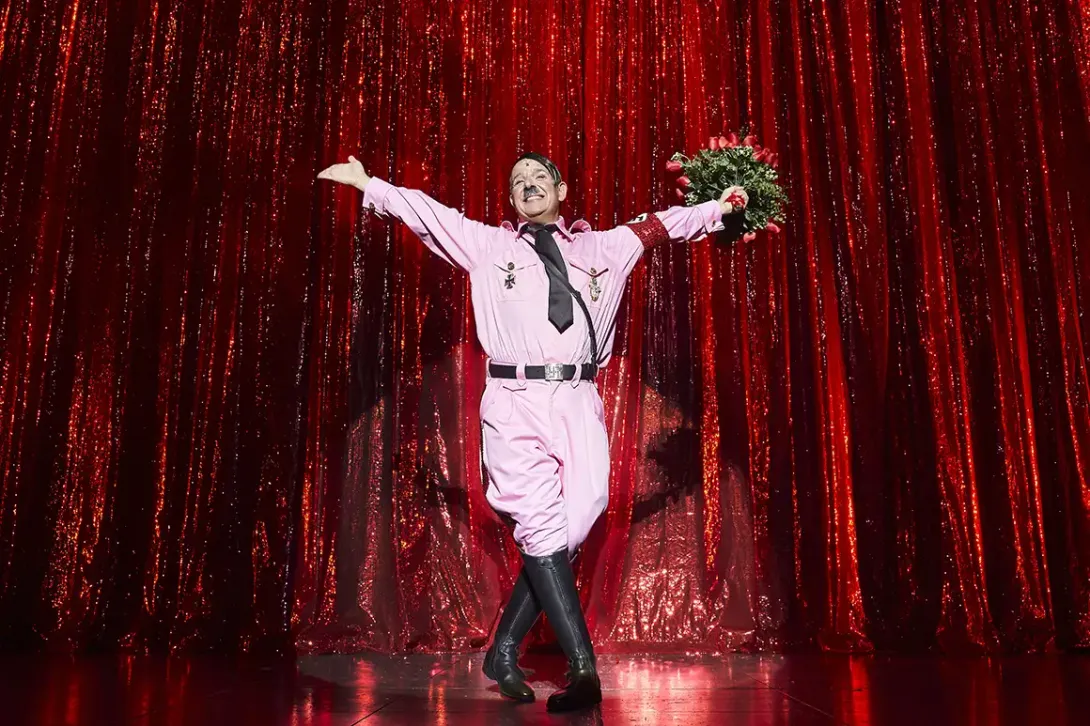
‘The producers’: Mel Brooks’ cult classic returns
‘The Producers’ has become the most awarded show in history. Now, after its success in Barcelona, the version adapted by Àngel Llàcer and Manu Guix lands in Madrid.
In the last five years, the duo formed by Àngel Llàcer and Manu Guix has brought some of the most famous musicals in history to national stages. Starting with their adaptation of La jaula de las locas in 2018, they have been stringing hits together with the irreverent delirium of La tienda de los horrores (2019) and the undeniable magic of Cantando bajo la lluvia (2021).
Observing this triumphant trail, their new proposal seems at once an inevitability and a somewhat risky bet: The Producers, the singular satire by the legendary filmmaker Mel Brooks, released as a film in 1967 and made into a play in 2001.
A scam turned into success
At a first glance, the plot seems simple: Max Bialystock (played by Armando Pita), a ruined theatre producer whose plays do nothing but fail, discovers through his histrionic, repressed accountant, Leo Bloom (Ricky Mata), that if he raises a large amount of money to produce a lousy play and puts it on for a much smaller budget, he can keep the extra money for himself when it’s cancelled after a few performances, as the tax office never investigates shows that fail.
So Bialystock and Bloom, now a neophyte producer, undertake the task of finding the worst script ever written and producing the biggest flop in Broadway history.
The text turns out to be Flowers for Hitler, an ode to the Führer written by an exiled ex-Nazi pigeon farmer (Jose Luis Mosquera), and the way to turn it into an even bigger disaster is to recruit Roger de Bacle (Àngel Llàcer/Oriol Burés), affected, volatile and stubborn, as director.

It is easy to guess how much of its mordacity and genius, elements that make The Producers captivating and incredibly funny, are also precisely those that make it a daring and divisive work, and a somewhat audacious proposition for Llàcer and Guix: a cast of eccentric and ridiculous characters, the satirization of a character like Hitler, the meta-commentary on the intricacies of the theatre industry.
Mel Brooks himself admitted in an interview with Vanity Fair in 2004 that “they saw it in the big cities, but would people in Kansas understand what it takes to raise 1,000% [of the budget] to put on a Broadway show?
From Brodway to Barcelona and Madrid
The same concern could be transferred to the Spanish public, but any worries are silenced when contemplating the project’s grandeur: with a cost of 2.7 million euros, an ambitious two-level set design, a team of 24 actors and dancers and a live orchestra, The Producers is the biggest show Llàcer and Guix have ever created, and, during its 6 months of performances in Barcelona, it became one of the most watched musicals of the season.
Their triumph is a consequence of the quality stamp that this duo has turned their names into, but also due to the spectacular nature of the particular proposal and how well it fits their creative vision: the work is both iconoclastic and a celebration of theatre, outrageous and self-aware at the same time.
Now, with 12 weeks of performances (so far) at Nuevo Teatro Alcalá in Madrid, The Producers has the opportunity to consolidate the success achieved in Barcelona and become a badge in the band worn by this theatrical team.




